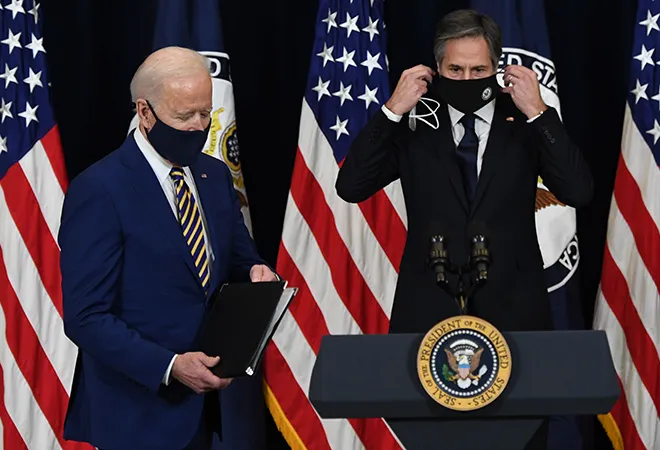-
CENTRES
Progammes & Centres
Location
The US is stuck in the Cold War-era thinking on Russia and lacks a road-map on China. Partners will be concerned

Last week, the newly elected president of the United States (US), Joe Biden, delivered his first foreign policy speech, with the aim of resetting America’s foreign policy agenda after four years of Donald Trump’s disruption. Biden’s choice of the State Department as the venue for his address was a show of support to the foreign service bureaucracy, and a signal to the world that standard diplomatic engagement and multilateralism would be the preferred mode of operation.
Announcing “America is back” and declaring the return of diplomacy in US foreign policy, Biden was perhaps hoping to underscore the divergences with his predecessor. But for all the rhetoric, the speech was a mélange of the Democratic Party’s standard talking points without a cohesive agenda for the changing global realities. The fact that China was hardly mentioned in his remarks and that Russia remained the obsession was also a reminder of how sections of the American establishment are still struggling to come to terms with the post-Cold War period.
Trying to strike an explicit contrast with Trump on Russia, Biden stated: “I made it clear to President
Other major announcements from Biden included ending all support for Saudi Arabia’s offensive operations in Yemen, urging Myanmar’s military leaders to halt their coup, freezing troop redeployments from Germany, raising the cap for refugees allowed into the US from 15,000 for this fiscal year — the lowest since 1980 — to up to 125,000, and reaffirming US support for LGBTQ rights worldwide. Secretary of Defence Lloyd Austin is to conduct a “global force posture review” so as to ensure America’s “military footprint is appropriately aligned with our foreign policy and national security priorities”. Biden also underlined his administration’s recent decisions of elevating cyber by appointing the first national deputy security adviser for cyber and emerging technology, integrating climate as a central facet of national diplomacy, and rejoining the World Health Organization and the Paris climate agreement.
But some key issues were conspicuous either by their absence or in their framing. Iran was not mentioned, nor were the nuclear negotiations, while the broader “Middle East” geopolitical terrain was also not invoked, perhaps underscoring a shift away from the region for American foreign policy priorities.
And then there was China. Biden argued that America will confront Beijing’s “economic abuses, counter its aggressive, coercive action to push back on China’s attack on human rights, intellectual property, and global governance”. But how this will be done, once again, remains in the realm of speculation. Biden is right that China’s President Xi Jinping doesn’t have “a democratic, small D, bone in his body” and his Secretary of State is also right in letting Beijing know that Washington “will continue to stand up for human rights and democratic values, including in Xinjiang, Tibet and Hong Kong”. But if the only instrumentality they can come up with is “international rules of the road”, then it doesn’t generate much confidence in Biden’s ability to shore up a credible posture vis-à-vis an increasingly confident China.
One area where Trump’s imprint remains palpable is in making American foreign policy viable for ordinary Americans. On that, Biden was categorical: “There’s no longer a bright line between foreign and domestic policy. Every action taken in our conduct abroad, we must take with American working families in mind.” His national security adviser Jake Sullivan was equally emphatic when he suggested that “everything” the Biden administration does when it comes to foreign policy will be examined as to whether it makes life “better, safer and easier for working families,” arguing that US foreign policy has no chance of succeeding unless the middle class sees it advancing its own interests. So, for all the talk of America being back, its global footprint will be a function of the domestic consensus, which is fraying rapidly.
And as a consequence, America’s global interlocutors are left wondering what all the fuss is about of Biden bringing America back to the global stage. On Russia, there is no clarity on what Washington can do apart from its rhetorical flourishes. In Myanmar, America’s sanctimonious calls for sanctions and isolation will only make China a more potent player. On China, where actually America’s leadership has been pretty strong under Trump, platitudes won’t work anymore. In the Indo-Pacific, regional powers have to respond to China’s rise in real-time. They have little time or patience for Biden’s inability to articulate a coherent China policy.
Biden’s first foreign policy speech was certainly in tune with the changing domestic political dynamic in the US. But its lack of a strategic vision will be concerning to America’s partners. For all his desire to forge a “united front” against Beijing, Biden has not been able to articulate a compelling vision of America’s role in the world so far. Strategic patience is in short supply around the world today.
This commentary originally appeared in Hindustan Times.
The views expressed above belong to the author(s). ORF research and analyses now available on Telegram! Click here to access our curated content — blogs, longforms and interviews.

Professor Harsh V. Pant is Vice President – Studies and Foreign Policy at Observer Research Foundation, New Delhi. He is a Professor of International Relations ...
Read More +